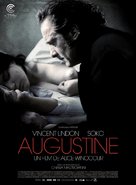Reviews provided by RottenTomatoes
A.O. Scott, New York Times: Ms. Winocour is not inclined to turn "Augustine" into a neatly moralized fable of a predator and his victim. Rather, the film is what might be called a melodrama of transference ... Read more
John Anderson, Wall Street Journal: Soko is terrific, but it is Mr. Lindon who delivers the performance of the film, his internalized consternation amounting to an eloquent dispatch from the war between the sexes. Read more
Peter Keough, Boston Globe: Winocour does not reduce her characters to caricatures, but depicts them as unwitting actors in the tragedy of a pathological society. Read more
Ben Sachs, Chicago Reader: The psychosexual drama plays out beneath the surface -- the movie is so understated it sometimes feels inert. Read more
Tom Long, Detroit News: By the film's end, it's clear what Augustine is running from, but it's hard to grasp where she was in the first place. Read more
Neil Young, Hollywood Reporter: Overall, this is a handsomely-mounted period picture which transcends the stuffiness of costume-drama with sufficient aplomb... Read more
Stanley Kauffmann, The New Republic: The writer-director Alice Winocour creates a kind of subdued excitement of discovery. Read more
John Anderson, Newsday: The hysterics contained in Alice Winocour's "Augustine" -- and "hysteria" is what it's about -- can't obscure the understated, smoldering subtext of what is a sometimes playfully smart and irony-laden story. Read more
Richard Brody, New Yorker: Vague conjurings of mood take the place of insight, sentiment takes the place of complexity, and a clumsy and superficial attention to the rigid script keeps the movie from coming to life. Read more
Stephen Whitty, Newark Star-Ledger: A dark, and rather disturbing debut. Read more
Mark Jenkins, NPR: Visually, the film conjures the past with shadowy interiors and harsh light. Winocour, who also scripted, often makes her points without words. Read more
Elizabeth Weitzman, New York Daily News: [A] somber, intelligent period drama ... Read more
Farran Smith Nehme, New York Post: Winocour skillfully films Augustine being exhibited for other doctors in several disturbingly erotic scenes, but elsewhere Soko's stolid, one-note demeanor takes a toll. Read more
Godfrey Cheshire, Chicago Sun-Times: Ultimately, while this character-based drama proves consistently engrossing, it leaves various pertinent and fascinating issues frustratingly unexplored. Read more
Mick LaSalle, San Francisco Chronicle: That the film raises interesting questions might be good enough, except that, while the movie goes about denying us information we want, it gives us details we don't need. "Augustine" churns slowly and doesn't make for compelling viewing. Read more
Colin Covert, Minneapolis Star Tribune: Though the tone is solemn, I took the finale as a knowing, agreeably dirty joke. Read more
Bill Stamets, Chicago Sun-Times: French physician Jean-Martin Charcot hypnotized, photographed and exhibited a hysteric, as does French director Alice Winocour for a clinical love story and empowerment tale. Read more
Eric Hynes, Time Out: Plays like a gothic prequel to David Cronenberg's A Dangerous Method, one in which human flesh is viewed as both horrific and erotic terrain. Read more
Leslie Felperin, Variety: Anchored by two intense, intertwined perfs by veteran Vincent Lindon and relative newcomer Soko, this period drama offers a coolly febrile study of madness, Victorian sexual politics and power. Read more
Ernest Hardy, Village Voice: The film is something of a paradox, simultaneously passionate and dispassionate, its ending tethered to both bruised triumph and a sense of things falling apart. Read more
Michael O'Sullivan, Washington Post: Fiercely yet faithfully imagined by... Alice Winocur, [the film] is not exclusively a mystery. It's also part love story, part horror story, as well as a parable of gender, power and the enduring enigma that is the mind-body connection. Read more

